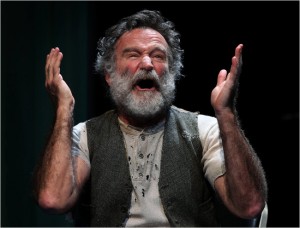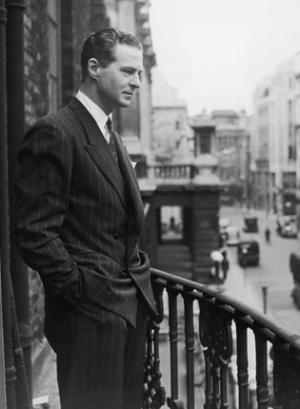 From time to time I get spotted in public, occasionally with unpredictable results. I’ve relieved to say that I’ve never gotten a right to the jaw or a pie in the face, but last Friday I was standing in front of the Stephen Sondheim Theatre, waiting to see Anything Goes, when an older fellow with a perfect Mittel-European accent walked right up to me, peered in my face, and said, “You’re the guy who wrote the book about Louis Armstrong? I read it. I recognized your face! Nice to see you!” He then vanished into the crowd, leaving me…well, bemused, I guess. I hope he liked it.
From time to time I get spotted in public, occasionally with unpredictable results. I’ve relieved to say that I’ve never gotten a right to the jaw or a pie in the face, but last Friday I was standing in front of the Stephen Sondheim Theatre, waiting to see Anything Goes, when an older fellow with a perfect Mittel-European accent walked right up to me, peered in my face, and said, “You’re the guy who wrote the book about Louis Armstrong? I read it. I recognized your face! Nice to see you!” He then vanished into the crowd, leaving me…well, bemused, I guess. I hope he liked it.
I’m always happy to accept compliments (if that’s what this was) from strangers on the sidewalk, but if you’d like to have a more extended face-to-face encounter with me this week, here are two opportunities:
• On Tuesday in Manhattan I’ll be presenting excerpts from Danse Russe, my new operatic collaboration with Paul Moravec, as part of a midday program at the Jewish Community Center, which is located at 334 Amsterdam. The show starts at 12:30 p.m.
For more information, go here.
To read more about the arts festival of which Danse Russe (which opens in Philadelphia on April 28) is a part, go here.
• On Sunday I’ll be in Malvern, Pennsylvania, taking part in a public conversation with Abigail Adams, the artistic director of People’s Light & Theatre, one of my favorite regional theater companies. Our subject is Horton Foote, whose Dividing the Estate is about to be staged by PL&T (the production opens on May 11). The event starts at six o’clock.
For more information, go here.
Archives for 2011
TT: Almanac
“There could be no honor in a sure success, but much might be wrested from a sure defeat.”
T.E. Lawrence, Revolt in the Desert
TT: Toothless Tiger
It’s back to business as usual on Broadway: I do the job on Bengal Tiger at the Baghdad Zoo in today’s Wall Street Journal. Here’s an excerpt.
* * *
If you’re a movie star, you can do pretty much anything you want on Broadway. You can make your stage debut there, regardless of whether you’ve ever performed in front of an audience. You can be the leading man in a musical, despite the pesky fact that you’ve never sung anywhere but in your shower. You can even finagle a bunch of producers into putting up the cash to mount an ostensibly serious new play, the kind that normally wouldn’t have a chance of opening anywhere near Times Square. Which explains the unlikely presence on Broadway of Rajiv Joseph’s “Bengal Tiger at the Baghdad Zoo,” a symbolic drama about the horrors of the war in Iraq that has just transferred to New York from the Kirk Douglas Theatre in Los Angeles with a single cast change: Robin Williams is making his Broadway debut in the title role….
 Mr. Williams’ tiger is a foul-mouthed comedian-predator who is shot to death by Kev (Brad Fleischer), a loutishly stupid American soldier, when he bites off the hand of Tom (Glenn Davis), Kev’s corrupt buddy. The tiger’s ghost then wanders the streets of Baghdad circa 2003, in the process rubbing shoulders with other ghosts, among them that of Uday Hussein, Saddam’s son (Hrach Titizian). In between these spectral encounters, we meet various other Iraqi citizens, all of whom are compromised to the degree that they have been forced to do business either with the Hussein family or the U.S. armed forces. We are, in short, in the shadowy land of moral equivalence, that mysterious domain where God is dead, life is absurd and everyone is no damn good.
Mr. Williams’ tiger is a foul-mouthed comedian-predator who is shot to death by Kev (Brad Fleischer), a loutishly stupid American soldier, when he bites off the hand of Tom (Glenn Davis), Kev’s corrupt buddy. The tiger’s ghost then wanders the streets of Baghdad circa 2003, in the process rubbing shoulders with other ghosts, among them that of Uday Hussein, Saddam’s son (Hrach Titizian). In between these spectral encounters, we meet various other Iraqi citizens, all of whom are compromised to the degree that they have been forced to do business either with the Hussein family or the U.S. armed forces. We are, in short, in the shadowy land of moral equivalence, that mysterious domain where God is dead, life is absurd and everyone is no damn good.
Might it be possible to write a first-rate play about the war in Iraq that proceeds from these assumptions? Absolutely. The animating premise of “Bengal Tiger in the Baghdad Zoo” is clever enough, and the script is structured skillfully. The trouble is that the play so rarely says anything unpredictable. It is, to be sure, a trifle unexpected that Uday should be unapologetically portrayed as a slick, Westernized monster of the will who tortures and kills because he feels like it. But to make both soldiers cartoonish Ugly Americans is too easy by half…
Mr. Williams’ performance is equally predictable, but it’s not his fault, for he’s playing the tiger as written: The script calls for a superficial Hollywood-style performance, and he obliges…
* * *
Read the whole thing here.
TT: The other centenarian
In my “Sightings” column for today’s Wall Street Journal I pay tribute to Terence Rattigan, a major twentieth-century playwright whose work is now virtually unknown in the United States. Here’s an excerpt.
* * *
Tennessee Williams was born a hundred years ago last week, and if there haven’t been many celebrations, it’s because they aren’t necessary. His best plays are performed regularly throughout America, and he is universally regarded as one of our greatest writers. But 2011 is also the centenary of Terence Rattigan’s birth, yet you’d be hard pressed to find anyone on this side of the Atlantic who is aware of the fact. Indeed, few American theatergoers are likely even to recognize Rattigan’s name, much less to know that the author of “Separate Tables” and “The Winslow Boy” was one of the 20th century’s most popular and successful playwrights. I’ve written scarcely a word about him in this paper’s drama column. Why? Because none of his two dozen plays, so far as I know, has received a major professional production in the U.S. since I became the Journal’s theater critic in 2003….
 Why did Rattigan drop off the scope? Because he specialized in stylish, “well-made” plays about the English middle class and its deceptively genteel discontents. “I believe that the best plays are about people and not about things.” Rattigan wrote in 1950, and back then most people agreed with him. Starting in the late ’50s and early ’60s, a new generation of politically conscious playwrights like John Osborne and Shelagh Delaney started writing harsh portrayals of life on the wrong side of the tracks, and within a matter of years the determinedly apolitical Rattigan had become a period piece. But now that the “swinging ’60s” have themselves passed into history, it’s possible once again for English playgoers to unapologetically savor his sharp wit and elegant craftsmanship.
Why did Rattigan drop off the scope? Because he specialized in stylish, “well-made” plays about the English middle class and its deceptively genteel discontents. “I believe that the best plays are about people and not about things.” Rattigan wrote in 1950, and back then most people agreed with him. Starting in the late ’50s and early ’60s, a new generation of politically conscious playwrights like John Osborne and Shelagh Delaney started writing harsh portrayals of life on the wrong side of the tracks, and within a matter of years the determinedly apolitical Rattigan had become a period piece. But now that the “swinging ’60s” have themselves passed into history, it’s possible once again for English playgoers to unapologetically savor his sharp wit and elegant craftsmanship.
What is harder to say is whether Rattigan’s plays have any chance of finding an audience in the U.S. The problem is that virtually all of his best work is permeated with two quintessentially English themes that are unusually difficult for American actors and directors to understand: class differences and emotional inhibition. In a Rattigan play, you never have to ask where a character went to school or what he does for a living. You can tell by his accent–or his tie….
* * *
Read the whole thing here.
A scene from the 1951 film version of Rattigan’s The Browning Version, starring Michael Redgrave:
TT: Almanac
“Do you know what ‘le vice Anglais‘–the English vice–really is? Not flagellation, not pederasty–whatever the French believe it to be. It’s our refusal to admit our emotions. We think they demean us, I suppose.”
Terence Rattigan, In Praise of Love
TT: So you want to see a show?
Here’s my list of recommended Broadway, off-Broadway, and out-of-town shows, updated weekly. In all cases, I gave these shows favorable reviews (if sometimes qualifiedly so) in The Wall Street Journal when they opened. For more information, click on the title.
BROADWAY:
• La Cage aux Folles (musical, PG-13, adult subject matter, reviewed here)
• How to Succeed in Business Without Really Trying (musical, G/PG-13, perfectly fine for children whose parents aren’t actively prudish, reviewed here)
• The Importance of Being Earnest (high comedy, G, just possible for very smart children, closes July 3, reviewed here)
• Lombardi (drama, G/PG-13, a modest amount of adult subject matter, reviewed here)
• Million Dollar Quartet (jukebox musical, G, reviewed here)
OFF BROADWAY:
• Angels in America (drama, PG-13/R, adult subject matter, closes Apr. 24, reviewed here)
• Avenue Q (musical, R, adult subject matter and one show-stopping scene of puppet-on-puppet sex, reviewed here)
• The Fantasticks (musical, G, suitable for children capable of enjoying a love story, reviewed here)
• Play Dead (theatrical spook show, PG-13, utterly unsuitable for easily frightened children or adults, reviewed here)
CLOSING NEXT WEEK ON BROADWAY:
• Driving Miss Daisy (drama, G, possible for smart children, closes Apr. 9, reviewed here)
CLOSING NEXT WEEK OFF BROADWAY:
• Molly Sweeney (drama, G, too serious for children, closes Apr. 10, reviewed here)
CLOSING NEXT WEEK IN WASHINGTON, D.C.:
• Who’s Afraid of Virginia Woolf? (drama, PG-13/R, Washington remounting of Chicago production, adult subject matter, closes Apr. 10, Chicago run reviewed here)
CLOSING SUNDAY IN WEST PALM BEACH, FLA.:
• Ghost-Writer (drama, G, closes Apr. 3, reviewed here)
TT: Almanac
“The penalty of success is to be bored by people who used to snub you.”
Nancy Astor (quoted in Reno Evening Gazette, May 4, 1964)
TT: Snapshot
Sid Caesar, Imogene Coca, Howard Morris, and Carl Reiner perform “From Here to Obscurity,” a parody of the film version of From Here to Eternity originally telecast on NBC’s Your Show of Shows:
(This is the latest in a weekly series of arts-related videos that appear in this space each Wednesday.)
